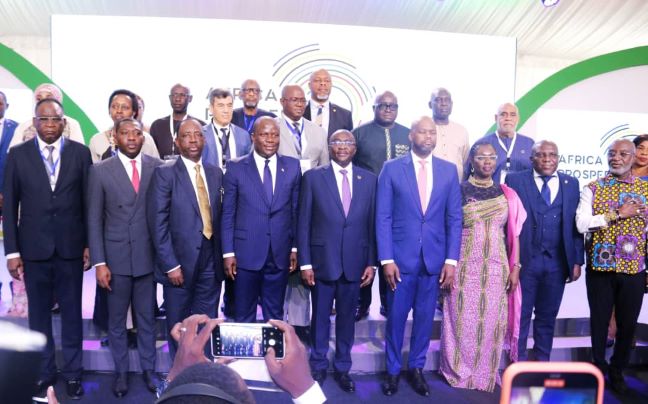Vice-President Alhaji Dr. Mahamudu Bawumia says the African Continental Free Trade Area (AfCFTA) can increase intra-African trade by some $35 billion each year when fully realised.
Imports to reduce by $10bn
In addition, he noted that the initiative touted as the real economic prosperity game-changer can reduce imports from outside the continent by some $10 billion annually.
Lifting 3 million out of poverty
Addressing the maiden Africa Prosperity Dialogue, held at Adukrom in the Eastern Region, Dr Bawumia said a fully realised AfCFTA will mean more opportunities for growth and for small businesses and the potential to lift more than three million people out of poverty.
Smart investments in critical infrastructure
In view of this great economic and developmental potential, he proposed the need for smart investments in critical infrastructure on the continent as a way of catalysing intra-African trade.
Produce and trade our way out of poverty
He said, “as a continent, we need to produce and trade our way out of poverty and underdevelopment, and we cannot do that without investing in smart infrastructure across the continent.”
Arteries of trade
These investments, which he described as ‘the arteries of trade,’ include physical infrastructure such as roads, rail, and energy; digital infrastructure such as data centres to facilitate the digital transformation and financial infrastructure to allow for integration financial markets.
These investments he stressed “will be critical to delivering the success of the AfCFTA.”
Unleash productive capacities in Africa
Dr Bawumia also pointed to the need to unleash the productive capacities across the continent, by creating platforms for knowledge brokerage and access to information on critical products and services on the continent.
445m small businesses
This, he believes, will allow 445 million small businesses across the continent to plug into the value chains of the mega industries.
Manufacturing zone
“We need to develop Africa into a manufacturing zone that will facilitate the trade of value-added products. These, in my view, will be critical to leapfrog Africa’s industrialisation and the enormous socio-economic benefits,” averred.
Mobilising of finance
The Vice-President called for the mobilising of finance and investments across the continent.
$170bn needed annually to close infrastructure gap
This is crucial, as Africa needs between $130 billion and $170 billion annually to bridge its infrastructure gap and generate sustainable growth at 5% per annum or more.
Opportunities for private sector
This situation, Dr Bawumia said, “presents immense opportunities for private sector investment.”
Public-Private Partnerships
Attracting private sector participation through Public-Private Partnerships (PPPs), he therefore indicated, is essential for the delivery of various infrastructure projects.
This coupled with innovative policies to mobilise and more effectively allocate resources are key for the continent’s development.
AfCFTA Secretariat Secretary-General
Secretary-General AfCFTA Secretariat, Wamkele Mene, stated that when fully implemented, the AfCFTA has the potential to raise incomes on the continent by about nine per cent.
Competition protocol
The establishment of a competition protocol that will create a single integrated market for the regulation of markets across the continent to overcome challenges such as food insecurity, access to good medicines to address public health needs and other areas of competition is also vital.
The Secretary-General noted that the continent had learnt lessons from the coming of the COVID-19 virus, where Africa was squeezed out in the scramble for critical vaccines and medicines by the more established powers.
Vaccine manufacturing value chains
With this experience at the back of their minds, a number of African countries, including Ghana, Rwanda and South Africa have established vaccine manufacturing value chains to bring the continent up to par with the rest of the world in the development of vaccines.
Protocol on intellectual property rights
This has led to the completion of the protocol on intellectual property rights, which will establish a legal framework that will enable faster, easier and more efficient access to pharmaceutical products, including vaccines.
He however warned that if African markets remain fractured, then the potential that the continent has, will not be fulfilled.
Resilient and sustainable economy
In a speech read on his behalf, the acting Executive Secretary of the United Nations Economic Commission for Africa (UNECA), Dr Antonio Pedro, said “Africa needs to build a resilient and sustainable economy to be able to withstand external shocks.”
The AfCFTA, he therefore said, will deliver Africa’s prosperity by fueling growth, providing decent jobs, raising living standards, and integrating and consolidating Africa into a single market.
Studies done by UNECA show that by 2045, intra-African trade in agriculture/food, industry and services will have increased by about 35%, compared to what would have pertained without the AfCFTA, thus making a business and socio-economic case for the implementation of the trading block.
This promise, he however pointed out, “will not come through if governments do not implement the AfCFTA agreements fully and effectively, or if the African private sector fails to grab the opportunity of a single market yielded by the agreement. .”
The real test of AfCFTA, he said, will depend on what the governments do back home.
Founder and Executive Chairman
Founder and Executive Chairman of Africa Prosperity Network Gabby Asare Otchere-Darko described Africa’s prosperity through AfCFTA as potentially, the world’s most exciting economic project this century.
He emphasized how to get the private sector to be deliberately and actively engaged in delivering the great ambition that AfCFTA represents.
He stated that the aggregate value of enterprises and industries across Africa must be networked, coordinated and impactfully leveraged.
Otchere-Darko said the dialogue provides a platform to sit together, think together, plan together, and work together, with urgency, to intensify the efforts towards achieving the goals of AfCFTA.
He is hopeful that the dialogue will build a strong network of Pan-African partnership to make this annual retreat a most powerful, actionable platform of choice for building the one, prosperous Africa we want and know we can get done.
The Executive Director for the Africa Prosperity Network, Dr Eugene Owusu, on his part, said, “The game changer is going to be the speed and scope of the implementation of the AfCFTA. Therefore, we must, all of us, see the implementation of the AfCFTA as a sprint, and not a marathon.
“This is what this maiden African Prosperity Dialogue is seeking to catalyse, to move us from ambition to action,” he said.
He charged the continent to keep its eyes and thoughts beyond the current challenges confronting it, but rather to the hopes of tomorrow inspired by AfCFTA.
“At the APN we believe strongly that this is a now or never moment. The vision that inspired our forefathers to establish the OAU has expression in the AfCFTA,” he said.
“We must be deliberate, all of us: business leaders, and policy leaders, in leveraging the African Prosperity Dialogues to develop the signature solutions needed to deepen intra-African trade to spur impact investment needed to bring prosperity to our continent and its people.
“That we must succeed in these efforts to be able to liberate our beloved continent from the yokes of the narratives created by others,” he added.
- Blewett: MTN CEO, a pilot, author, chartered accountant, marathon runner and many more - 3 April 2025
- MTN Ghana launches Y’ello Ladies Network - 3 April 2025
- GEMA unveils 5yr- strategic plan at 34th AGM - 3 April 2025

